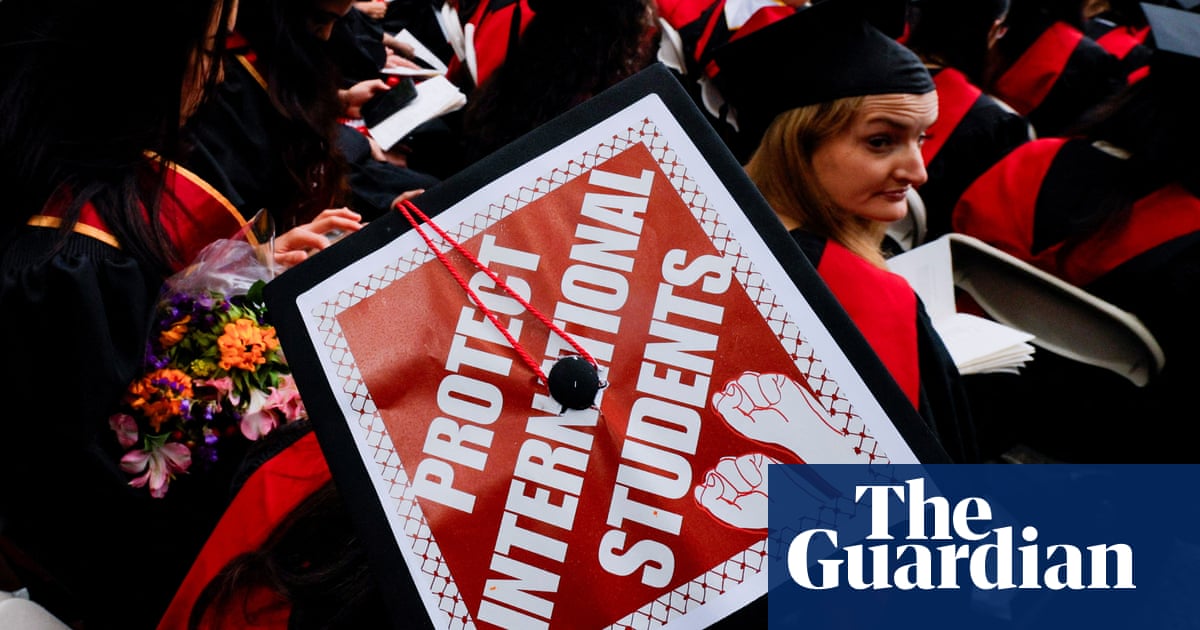A US federal judge will issue an injunction blocking theTrump administration’s efforts to preventHarvard Universityfrom enrolling international students, Reuters reported on Thursday.
The university was in court seeking to extend a temporary order blocking theTrump administrationfrom revoking the school’s right to host international students. The judge, Allison Burroughs, had issued an emergency block last week after the administration abruptly announced it would cancel Harvard’s ability to host international students – the latest and most severe escalation in the administration’s battle against higher education institutions.
As graduation ceremonies were under way on campus, lawyers for the university argued in federal court in Boston that the revocation announced by the government last week violates the US constitution’s free speech and due process rights as well as procedural law regulating government actions.
In a packed court room with several international students in attendance, Burroughs said she wanted to “maintain the status quo” while the case makes its way through the courts.
Incourt documentsfiled on Wednesday, the director of immigration services at the university’s international office said that the administration’s announcement has caused “profound fear, concern, and confusion” among faculty and students.
“Many international students and scholars are reporting significant emotional distress that is affecting their mental health and making it difficult to focus on their studies,” she wrote. “Some are afraid to attend their own graduation ceremonies this week out of fear that some immigration-related action will be taken against them.”
On Thursday, shortly before the hearing, the Department of Homeland Securityformally notifiedHarvard that it would withdraw the university’s certification under the federal Student and Exchange Visitor Program (SEVP), the system that allows universities to enroll non-US students. But the move, which gave the university 30 days to contest the revocation through an administrative process, indicated it was backtracking from the immediate revocation the administration announced last week.
In astatement, the department’s head, Kristi Noem, doubled down on her allegations against Harvard, which she has accused of “pro-terrorist conduct”, “encouraging and allowing antisemitic and anti-American violence” and of “coordinating with Chinese Communist Party officials on training that undermined American national security”.
“Harvard’s refusal to comply with SEVP oversight was the latest evidence that it disdains the American people and takes for granted U.S. taxpayer benefits,” Noem added.
If allowed to stand, the administration’s action against Harvard would affect a quarter of the university’s population: approximately 5,000 current students, as well as 2,000 recent graduates enrolled in optional practical training, a post-graduation work programme.
Sign up toThis Week in Trumpland
A deep dive into the policies, controversies and oddities surrounding the Trump administration
after newsletter promotion
Harvard maintains that the administration’s decision is retaliation for the university’s refusal to abide by a series of overly broad demands made by the Trump administration that would severely undermine the university’s independence. The administration had demanded Harvard turn over information about its international students, including discipline records as well as student’s addresses, contact information and details about their coursework. It announced the revocations after it said the university failed to comply.
In April, the university became the first to sue the administration over billions in cuts to federally funded research – setting off a showdown with the White House, which earlier this week announced it would cancel all remaining government contracts with the university. In total, the administration has cut or frozen about $3bn in federal grants and contracts with Harvard.
Those cuts have already upended crucial medical and scientific research initiatives, but the latest attack on international students had spread panic among thousands of current and incoming international students – with many seeking last minute transfers to other universities, canceling summer travel plans for fear of not being able to return, or reconsidering plans to study in the US altogether. Some foreign universities have also seized on the crisis, looking to recruit Harvard students away from the US.
“International students and scholars are tremendous assets that contribute to US preeminence in innovation, research, and economic strength,” said Fanta Aw, executive director and CEO of Nafsa, the Association of International Educators. “Undermining their ability to study here is self-defeating. With these actions, the United States will alienate the very minds that fuel its success.”
